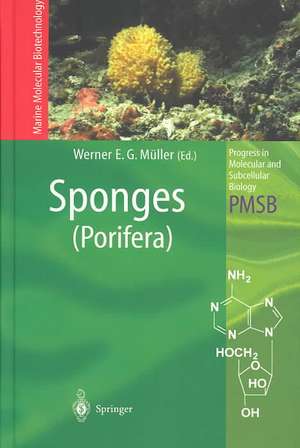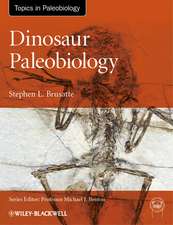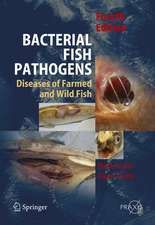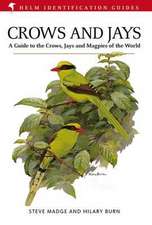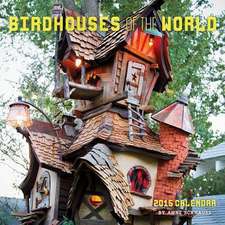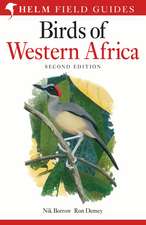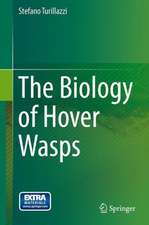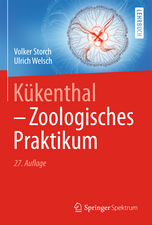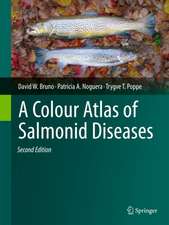Sponges (Porifera): Progress in Molecular and Subcellular Biology / Marine Molecular Biotechnology, cartea 37
Editat de Werner E.G. Mülleren Limba Engleză Hardback – 10 iul 2003
| Toate formatele și edițiile | Preț | Express |
|---|---|---|
| Paperback (1) | 387.20 lei 6-8 săpt. | |
| Springer Berlin, Heidelberg – 21 oct 2012 | 387.20 lei 6-8 săpt. | |
| Hardback (1) | 583.75 lei 6-8 săpt. | |
| Springer Verlag – 10 iul 2003 | 583.75 lei 6-8 săpt. |
Preț: 583.75 lei
Preț vechi: 686.76 lei
-15% Nou
Puncte Express: 876
Preț estimativ în valută:
111.70€ • 116.92$ • 92.97£
111.70€ • 116.92$ • 92.97£
Carte tipărită la comandă
Livrare economică 01-15 aprilie
Preluare comenzi: 021 569.72.76
Specificații
ISBN-13: 9783540009689
ISBN-10: 354000968X
Pagini: 258
Dimensiuni: 152 x 19 x 242 mm
Greutate: 0.57 kg
Ediția:2003. 3rd Print
Editura: Springer Verlag
Colecția Springer
Seriile Progress in Molecular and Subcellular Biology / Marine Molecular Biotechnology, Marine Molecular Biotechnology
Locul publicării:Berlin, Heidelberg, Germany
ISBN-10: 354000968X
Pagini: 258
Dimensiuni: 152 x 19 x 242 mm
Greutate: 0.57 kg
Ediția:2003. 3rd Print
Editura: Springer Verlag
Colecția Springer
Seriile Progress in Molecular and Subcellular Biology / Marine Molecular Biotechnology, Marine Molecular Biotechnology
Locul publicării:Berlin, Heidelberg, Germany
Public țintă
Scientists in biochemistry and pharmacology; research and development staff in the pharmaceutical industryCuprins
Analysis of the Sponge (Porifera) Gene Repertoire: Implications for the Evolution of the Metazoan Body Plan.- Sponge-Associated Bacteria: General Overview and Special Aspects of Bacteria Associated with Halichondria panicea.- Microbial Diversity of Marine Sponges.- Full Absolute Stereostructures of Natural Products Directly from Crude Extracts: the HPLC-MS/MS-NMR-CH "Triad".- Bioactive Natural Products from Marine Invertebrates and Associated Fungi.- Sustainable Use of Marine Resources: Cultivation of Sponges.- Sustainable Production of Bioactive Compounds from Sponges: Primmorphs as Bioreactors.-Approaches for a Sustainable Use of the Bioactive Potential in Sponges: Analysis of Gene Clusters, Differential Display of mRNA and DNA Chips.- Sorbicillactone A: a Structurally Unprecedented Bioactive Novel-Type Alkaloid from a Sponge-Derived Fungus.-
Textul de pe ultima copertă
Sponges (phylum Porifera) are known to be very rich sources for bioactive compounds, mainly secondary metabolites. Main efforts are devoted to cell- and mariculture of sponges to assure a sustainable exploitation of bioactive compounds from biological starting material. These activities are flanked by improved technologies to cultivate bacteria and fungi which are associated with the sponges. It is the hope that by elucidating the strategies of interaction between microorganisms and their host (sponge), by modern cell and molecular biological methods, a more comprehensive cultivation of the symbiotic organisms will be possible. The next step in the transfer of knowledge to biotechnological applications is the isolation, characterization and structural determination of the bioactive compounds by sophisticated chemical approaches.
Caracteristici
This new subseries sets the scientific stage for the development of new drugs, materials and insights into the biology of marine organisms
